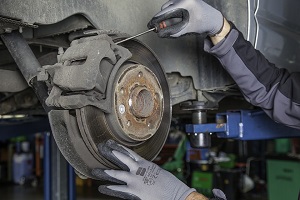How Do My Brakes Work?
How Do My Brakes Work?

It's a bright and sunny day, and you're cruising down the road with your windows open and music playing. Suddenly, the car in front of you slams on its brakes, forcing you to hit yours just as hard. You’re relieved when your car stops safely—without any issues. But have you ever stopped to think about how exactly your brakes work? You might know they need regular check-ups, but do you really understand the science behind them?
Brakes are one of the most important parts of your vehicle, yet many people don’t fully grasp how they function. In fact, it’s a fascinating process that combines physics, engineering, and precision. When you press the brake pedal, it triggers a chain reaction that ultimately brings your car to a stop.
The key to this system lies in hydraulic pressure. When you step on the brake, a lever inside the car pushes fluid through a series of tubes to the brake calipers. These calipers then push the brake pads against the rotors, creating friction that slows the wheels down. This is how your car comes to a halt, even at high speeds.
There are two main types of braking systems: disc brakes and drum brakes. Disc brakes, which are commonly used on modern vehicles, use a rotor and caliper to apply pressure. Drum brakes, found more often on older cars or in the rear wheels, use brake shoes that press against a drum. Both systems achieve the same goal, but they do it in different ways.
Understanding how your brakes work can help you appreciate their importance. It also highlights why regular maintenance is crucial. If your brakes aren't functioning properly, it could lead to dangerous situations. So, make sure to schedule routine inspections and services with a trusted mechanic to keep your brakes in top condition.
Next time you hit the brakes, take a moment to reflect on the complex system that keeps you safe. It's not just a simple pedal—it's a lifeline.
Suzhou Barjon Auto Parts Co.,Ltd , https://www.cn-barjon.com